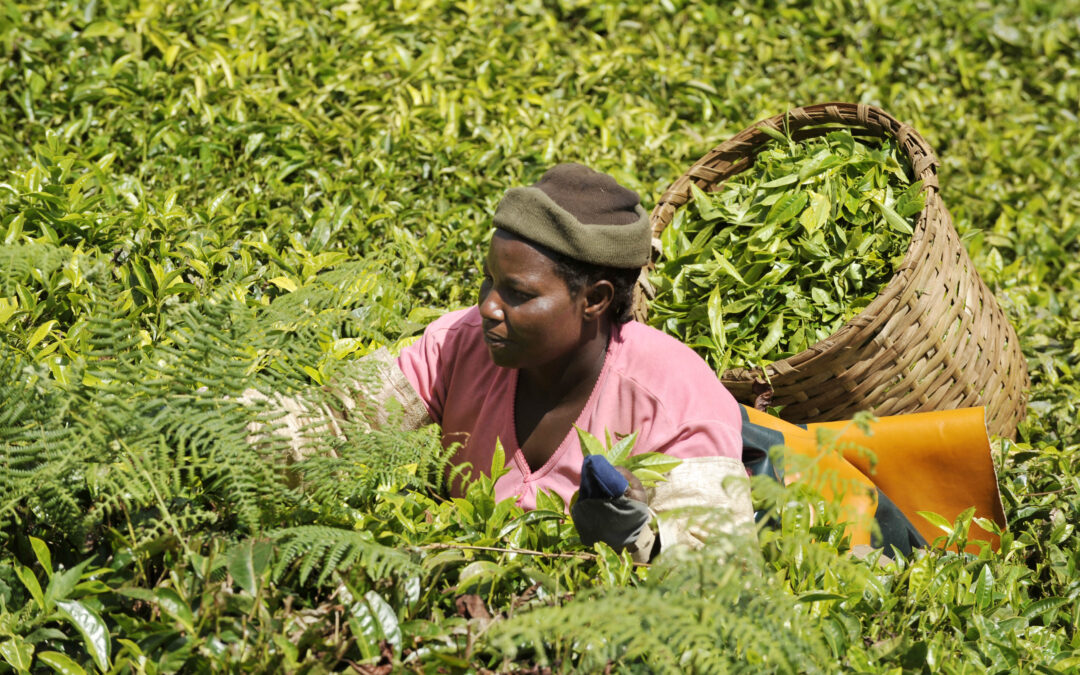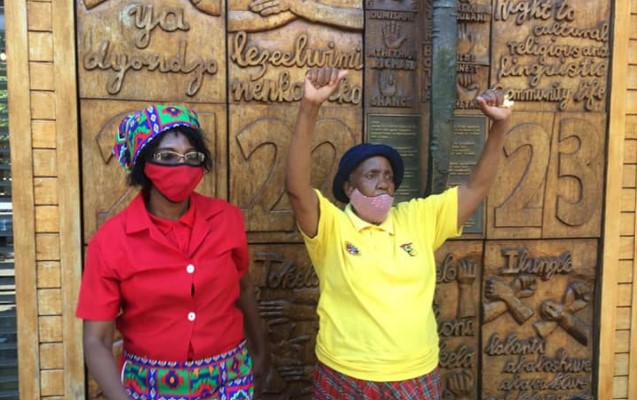
Jul 29, 2021
On this year’s July 30 World Day Against Trafficking in Persons, a coalition of rights organizations including the Solidarity Center are highlighting widespread wage theft perpetrated against Southeast Asia’s migrant workers. Although this form of labor exploitation has been thrown into stark relief during the COVID-19 pandemic, it is a long-standing problem in the region.
“Wage theft is a crime against humanity. If the global pandemic can be overcome, why not wage theft?” says Plantation Rural Education and Development Organization (PREDO) Sri Lanka Executive Director Michael Joachim.
The Justice for Wage Theft campaign is demanding governments address wage theft perpetrated against millions of migrant workers in the wake of the pandemic—including those who voluntarily returned home or were forcibly repatriated, often after employers unilaterally severed their contracts and stopped paying them their earned wages. Many such returnees now find themselves trapped in debt bondage to labor recruiters to whom they owe money on interrupted contracts and, sometimes, for emergency air fare, putting them at risk of labor exploitation. Debt bondage is one of the most prevalent forms of forced labor worldwide.
“The campaign is asking that indebted returnees be protected from exploitation and that migrant workers who returned home in fear for their lives receive their earned wages for work they completed,” says regional migrant rights expert and Solidarity Center Senior Program Officer Miyuru Guansinghe.
The Justice for Wage Theft’s website highlights coalition members’ work and provides a mechanism for collecting wage theft cases and signatures on a public petition for a just compensation mechanism. Coalition members are ASEAN Services Employees Trade Union Council (ASETUC), Cross-Regional Center for Refugees and Migrants (CCRM), Lawyers Beyond Borders, Migrant Forum in Asia (MFA), South Asian Regional Trade Union Council (SARTUC) and the Solidarity Center.
In two reports covering the period December 2019 through June 2021, the campaign documented more than 1,800 wage theft cases perpetrated against people migrating from Bangladesh, India, Indonesia, Nepal, Pakistan and the Philippines to work in agricultural, domestic, construction and other sectors in Bahrain, China, Kuwait, Lebanon, Malaysia, Maldives, Oman, Philippines, Qatar, Saudi Arabia, Sri Lanka and the United Arab Emirates. Volumes 1 and 2 of “Crying Out for Justice: Wage Theft against Migrant Workers” include hundreds of cases identified by the Solidarity Center during direct interviews with affected workers in five Sri Lankan districts.
Wage theft is an indicator of forced labor under International Labor Organization (ILO) standards, says MFA. Under ILO standards, states must develop wage-theft-eradication measures and effective justice mechanisms. Workers are also entitled to effective remedies—including prosecution of employers under criminal law, and payment of earned wages and other compensation, and governments must ensure workers’ wages are paid regularly and a final settlement of all wages is effected upon termination of an employment contract.
Forced labor is the most common result of human trafficking, with an estimated 25 million people trapped in often slave-like conditions. A United Nations report last year found that the percentage of trafficking victims exploited for forced labor is increasing over time and that surveyed countries reported a threefold increase in the number of trafficking victims from 2003 through 2018. Forced labor generates up to $150 billion a year in illegal profits for traffickers—including $51.2 billion made illegally from forced labor exploitation in domestic work, agriculture, forestry, fishing, construction, manufacturing, mining, utilities and other industries, says the International Labor Organization (ILO).
“Human trafficking is a violation that should have no place in civilized society, ” says Saviya Development Foundation Training and Program Director Thushara Senanayaka.
The Justice for Wage Theft campaign is an offshoot of MFA’s regional network of nongovernmental organizations, associations and trade unions of migrant workers, and individual advocates in Asia who are working to protect migrant worker rights and welfare. Such initiatives include efforts in coalition across the globe to improve COVID-19 vaccination access for migrant workers and their family members.
You can support the Justice for Wage Theft campaign by completing its online petition, “Say Yes to Justice!”

Jul 28, 2021
In a global context where most working people and their communities are being denied a say in their future according to the International Trade Union Confederation (ITUC), Kenya’s Central Organization of Trade Unions (COTU-K) is effectively engaging government and policy makers to represent the needs of working people in the development of climate change solutions.
“[N]early nine out of ten countries are… not using social dialogue,” says ITUC General Secretary Sharan Burrow about climate plans submitted by governments under the Paris Agreement on Climate Change. As defined by the International Labor Organization (ILO), social dialogue structures and processes are tools for promoting consensus building and democratic involvement among the main stakeholders in the world of work—representatives of governments, employers and workers—on issues of common interest.
In Kenya, the climate crisis is prompting more frequent and prolonged droughts, erratic rainfall, intermittent flooding, water scarcity and increased incidence of climate change-related diseases—which threaten people’s jobs and livelihoods in all sectors, especially agriculture, fishing, forestry, mining and tourism. Unions, says COTU-K, must take their place at the table to advance worker-centered climate solutions toward a sustainable and thriving future.
COTU-K, a Solidarity Center partner, has successfully represented the interests of Kenya’s most vulnerable citizens in multiple fora and processes, contributing to the country’s Climate Change Response Strategy, the National Climate Change Action Plan, Climate Change Act and, most recently, in the 2020 process of updating Kenya’s Nationally Determined Contributions (NDCs) under the Paris Agreement to include just transition elements. COTU-K is also a member of Kenya’s National Climate Change Council—a body chaired by President Uhuru Kenyatta that advises government on the development of climate change policies and legislation.
COTU-K’s just transition program is rooted in its vision of climate justice, which advocates for a low-carbon development path and actions to address climate change while simultaneously prioritizing the creation of good jobs and ensuring social justice, rights and social protection for all.
“Climate justice [will ensure] that the environmental and social costs of unsustainable production and consumption are met by the economic agents responsible for them,” and prevent the burdens of changes benefiting everyone being placed disproportionately on a few or the most vulnerable, says COTU-K.
The development of climate-related programs and policies requires active and informed public participation, says COTU-K. To this end, COTU-K is pursuing climate-justice coalitions with like-minded organizations, supporting climate and labor justice at both national and county levels of government, and providing worker-to-worker and union-to-union exchanges on effective climate justice strategies.
Jul 15, 2021
A hidden video-surveillance camera discovered on Monday was recording the entrance of the central office of the Confederation of Free Trade Unions of Ukraine (KVPU)—an act described by the organization as illegal and a possible attempt to interfere with trade union activity.
“The KVPU is deeply concerned about possible negative consequences for people, especially for activists and whistleblowers who visited our [Kyiv] office,” says KVPU Chairperson Mykhailo Volynets. Visiting diplomats and politicians may also have been illegally surveilled.
Describing the discovery as “alarming,” KVPU International Secretary Olesia Briazgunova says the organization is demanding a thorough police investigation and the opening of a criminal case.
“A lot of people come here to get legal assistance, discuss trade union activities or inform about corruption,” says Volynets, who fears for those helping KVPU prevent the adoption of draft laws that narrow worker rights in contradiction of international labor standards and those who are highlighting corruption in the coal industry and state-owned transport enterprises.
The recording of people without their consent, except in specific cases established by law, is prohibited by Article 307 of the Civil Code of Ukraine, says KVPU.
Jul 7, 2021
Legal experts supported by Solidarity Center partner Labor Initiatives (LI), an organization representing and advancing worker rights in Ukraine, contributed recommendations that were incorporated into the country’s latest National Human Rights Strategy. The 2021–2023 strategy—a legally binding document to be implemented by state authorities in accordance with United Nations International Standards and Principals and Ukraine’s Association Agreement with the European Union—was signed into force by President Volodymyr Zelensky earlier this year.
Up to 100 action points are listed in the new strategy, including several advanced by LI lawyers Inna Kudinska, George Sandul, Katia Shvets and Nadia Yolkina in sections on freedom of association, worker rights, social protections, business and human rights, and anti-discrimination.
“The increasing significance of the LI team’s expertise is reinforcing its ability to make workers’ voices heard,” says Solidarity Center Ukraine Country Program Director Stanislaw Cieniuch.
Action points successfully advanced by LI to promote gender equality include: 1) Ratification of Convention 190, a new global International Labor Organization (ILO) treaty to prevent and address violence and harassment in the world of work that includes gender-based violence and harassment; 2) Amendment of the national labor code on equal pay and reduction of the gender pay gap; and 3) Development of national policies to shift the burden of proof in discrimination cases—including gender-based cases—from the employee to the employer.
LI’s lawyers also advanced action points for amending the country’s law on collective labor disputes, including ways to improve dispute resolution procedures and remove bureaucratic barriers preventing workers from exercising their right to strike.
“Labor is the defining part of life for every person,” reports LI. “[S]trong labor rights protections and rule of law are core safeguards to avoid catastrophic consequences for the people of Ukraine.”
Ukraine’s National Human Rights Strategy—first developed in cooperation with international organizations and civil society in 2015—is intended to develop a document that outlines citizens’ legal protections and to unite society around a common understanding of the value of human rights and freedoms to be protected equally and without discrimination.

Jun 15, 2021
On June 16 International Domestic Workers Day, domestic workers are celebrating a landmark legal win by South Africa’s domestic workers for colleagues who die or are injured in their employers’ homes. For the first time, starting this year, domestic workers who suffer injury on the job are eligible for compensation for temporary and permanent disability, medical expenses, funeral costs and survivor benefits.
Until last year, South Africa’s approximately 1 million privately employed domestic workers suffered deaths and crippling injuries without access to compensation for themselves or their dependents because domestic workers were excluded from South Africa’s Compensation for Occupational Injury and Illness Act (COIDA). With Solidarity Center support, the South African Domestic Service and Allied Workers Union (SADSAWU) and human rights organization Socio-Economic Rights Institute of South Africa (SERI) litigated and won a long-denied claim for the dependent daughter of Maria Mahlangu, a privately employed and partially sighted domestic worker who had fallen into her employer’s swimming pool and drowned in 2012. The historic judgment, made by the South African Constitutional Court in mid-November, recognized that injury and illness arising from work as a domestic worker in a private home is no different to that occurring in other workplaces and thus equally deserving of COIDA coverage.
Myrtle Witbooi, general secretary of SADSAWU and the first president of the International Domestic Workers Federation (IDWF), said in addition to the last year’s court ruling, South Africa’s domestic workers can also celebrate this year’s hard-fought win under revised compensation rules of three years of retroactivity to submit claims.
Under the new rules, all employers of domestic workers must register with the Compensation Fund or face penalties, and make annual payments to cover their employees. SADSAWU is focusing its efforts on educating employers and domestic workers about their obligations and rights under the new rules, says Witbooi. SERI made a new domestic worker compensation information fact sheet available to domestic workers, paralegals and community advice offices this month, while SADSAWU is producing and distributing an educational WhatsApp video and pamphlet and translating the amendment into local languages.
The unions and SERI continue to press the government for more time for domestic workers to submit claims and increase retroactivity. “We must remain that beacon of hope for workers,” says Witbooi.
Meanwhile, another domestic worker, Nobuhle Ndlovu, drowned in her employer’s swimming pool last month.
Ten years after the adoption of an International Labor Organization (ILO) Convention confirmed their labor rights, domestic workers across the globe are still fighting for recognition as workers and essential service providers, as documented by a new ILO report. And, although 32 countries have ratified Domestic Workers Convention 189, and 29 have entered the convention into force, most of the world’s 75.6 million domestic workers are still being denied social protection rights, including access to national health insurance, pension schemes and compensation funds.



